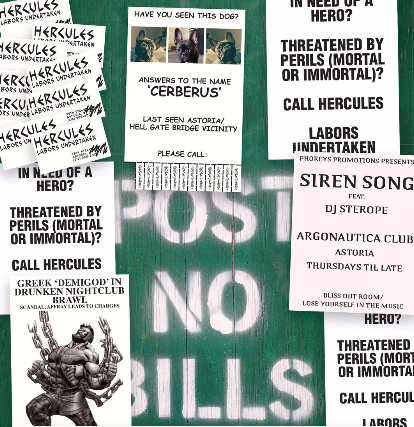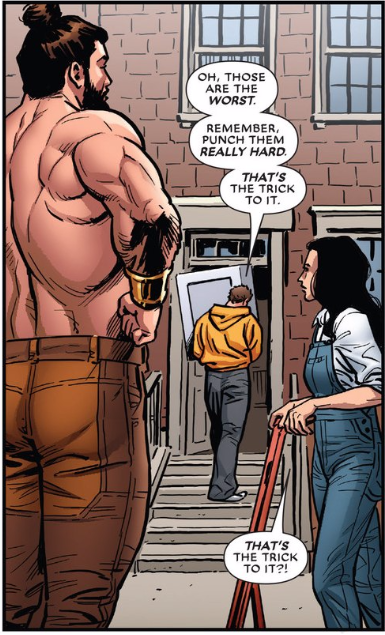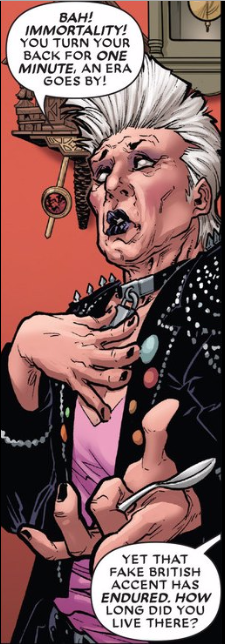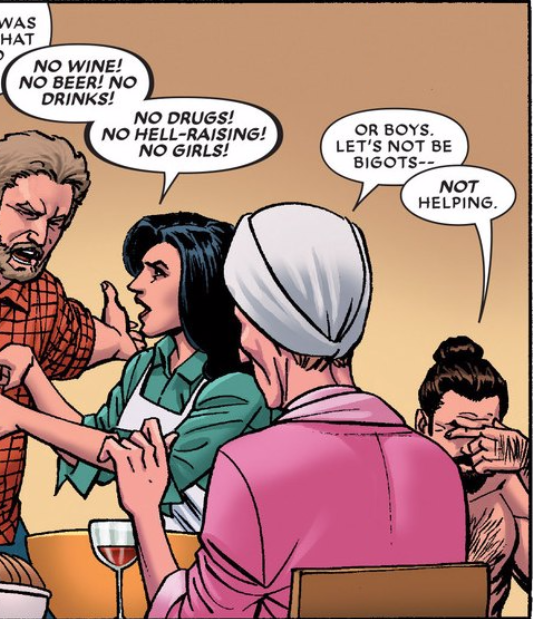Hot-headed. Charming. Brash. Fun. Thoughtless. Probably getting laid, liquored up, or both right this second. All fair ways to describe the Marvel Hercules we’re used to seeing. Historically, both in myth and in Marvel, the character of Hercules has served as a poster boy for masculinity, so powerful and self-assured that he can do virtually anything he wants without having to worry about the consequences, because, well, who’s going to make him?
Writer Dan Abnett and artist Luke Ross’s take on the Prince of Power is in direct dialogue with that Hercules and, by extension, with the type of manhood he represents. The run, kicked off with an all-new Issue #1 last fall, immediately establishes that this will be a modern, grounded take on the larger-than-life hero. It opens on a board marked “POST NO BILLS” that Hercules has absolutely papered with his business card and flyers, but his efforts are literally obscured by a story about his disgrace in a bar brawl.
From there we move quickly to a pair of children who, as I discussed in a Deadshirt is Reading from when Hercules #1 first came out, propitiate Herc with some kaiju cards he is absolutely adorable about accepting. In these opening pages, the Lion of Olympus is clearly trying hard here to be mindful of these children, his landlady Sophia, and his no-rent bum roommate Gilgamesh (fulfilling that role we so often associate with the Hero of Sumer, comic relief—wait, what?) as he sets out to repair his reputation in this world where punching bad guys is no longer something that automatically earns you respect.
The choice to represent Gilgamesh as a sweatshirt-clad layabout crashing on Hercules’s couch to the landlady’s chagrin at first reads like a fun little gag and nothing more. But as the arc develops, it becomes clear that Gilgamesh’s role as a hero who feels left out of the modern age and therefore just tries to avoid it is crucial to the themes at play.
The main antagonist(s) of this arc are the Uprising Storm, the new gods come to displace the old. While this could have read as an easy ripoff of Neil Gaiman’s American Gods, Abnett does excellent work in showing how his characters choose to react to these changing times, hammering home their thematic importance as effectively as Hercules’s mace—though with a finesse more accurately represented by the demigod’s modern combat techniques. Issue #2 does a great job of seeding this in a number of ways, especially when Hercules responds to a call for help to take on giants terrorizing New York. Gilgamesh, just like when the Prince of Power was called in to battle a sea monster in Issue #1, largely limits his support to saying, “Oh, those are the worst.” However, in the case of the giants, Gilgamesh, or Gil, as Hercules calls him, adds a bit of advice to his callback joke:
This is followed immediately by a Hercules caption: “That’s not the trick to it. Well, it used to be.” After that, Hercules draws a launcher to fire smoke grenades, filled with resin incense and camphor to subdue the superstitious giants.
Throughout this arc, Hercules looks for ways to adapt to these changing times, not only in the ways he acts—embracing technology to subdue enemies with minimal collateral damage—but also in the ways he thinks, as evidenced by his pep talks to Gil, his concerned conversations with (awesomely drawn) aging Brit punk chick Tiresias, and his apparent agreement to enter a program to curb his alcoholism, seemingly with Tony Stark as a sort-of sponsor.
These choices maintain Hercules’s core characteristics of determination, love of battle, and finding joy in the company of others, while instilling a level of thoughtfulness that reflects modern concerns over toxic masculinity and the influence of “political correctness.”
Hercules’s brand of guyhood is many things, and it’s undergoing a major shift. But one thing it never is is performative. Sure, he does things solely to gain adoration and glory in the eyes of others, but he’s never anything less than up front about that with himself and his adorers. A few times in this arc, Hercules makes note that he’s the first superhero, that there was no one to teach him how to do it. As a result, he is often treated as the ur-type for what makes a hero. By extension, he is, in a way, the ur-type for manhood. (This is not to preclude heroes of other genders, but Herc’s heroism is deeply rooted in masculinity.)
As a result, Abnett and Ross seem to be arguing that masculinity itself (Hercules) has found its ways of thinking outmoded and damaging to itself and others, and that choosing to change is not ceding ground to an enemy (something our boy Herc would never do) but adapting to achieve even greater things. For example, in his fight with the giants, Hercules admits he could have stomped his foes, torn Manhattan apart, cast them down into Tartarus, and then gone for a beer without looking back. But he sees their concerns are real, their intent not actually malicious, and he works with them to keep them safe from the Uprising Storm without hurting anyone else. This avoids the massive civilian casualties that would no doubt be associated with a prolonged fight followed by rending the earth to toss giants into Tartarus, and it nets Herc a new set of allies in the coming fight against the Uprising Storm. It’s entirely possible we’ll be seeing those giants again in Herc’s return, in the Civil War II tie-in Gods of War, which is being billed as “The Expendables, but with ancient gods and monsters.” That sounds 1) awesome and 2) like an excellent arena in which to further explore the societal questions Hercules has raised.
Abnett and Ross’s Prince of Power sees that the true measure of power is not in whom you can subjugate but in whom you can help. He seeks aid from friends when he needs it. He worries about the consequences of his actions – not because he has to, but because he should. And that’s what makes a hero worth looking up to.




